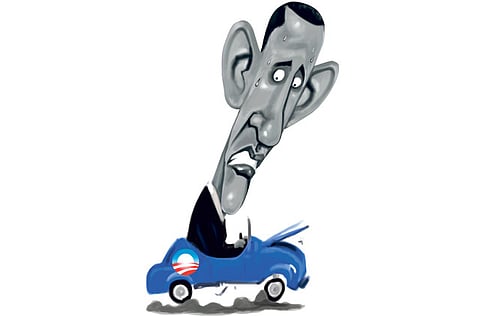Obama on a bumpy road to re-election
No president has run for re-poll when unemployment was over 8%, as it could be in 2012

One of the oddities of American politics is that midterm Congressional elections don't tell us what's likely to happen to a first-term president in the re-election campaign that follows.
Bill Clinton's Democrats suffered a catastrophic defeat in 1994, but Clinton cruised to easy re-election in 1996. George H.W. Bush's Republicans did well in 1990 by losing only a handful of seats, but Bush lost the presidency two years later. So let's ignore for a moment the noise of the coming midterm elections and look ahead to 2012 and the presidential campaign that's already under way.
The news of the past few weeks has raised early warning signals about President Barack Obama's prospects for re-election. Start with the economy. Until recently, Democrats were fairly confident that Obama could count on the economic recovery to gather steam next year in plenty of time to lift voters' spirits and make his re-election easier. Their historical model is Ronald Reagan, who suffered a big setback in the midterm elections of 1982, when unemployment was about as high as it is now, only to win re-election by a landslide in 1984 after the economy rebounded. But the last few weeks have brought a spate of forecasts that unemployment will actually rise in 2011 — perhaps over the 10 per cent mark — and remain stubbornly high well into 2012.
Goldman Sachs' chief US economist, Jan Hatzius, sees only two scenarios for next year: "fairly bad and very bad". In the likely ("fairly bad") scenario, he said at a recent conference, unemployment peaks "somewhere around 10, maybe a little above" in mid-2011, and falls only slowly in 2012. In the "very bad" scenario, the economy tumbles into another recession and unemployment rises even higher. Hatzius is a pessimist, but he isn't alone. Mark Zandi of Economy.com, who's normally more optimistic, agrees that unemployment is likely to rise above 10 per cent next year, although he says he still hopes a recovery will take hold by late 2011.
High unemployment is bad news for any president seeking re-election, of course. Sometimes an incumbent can overcome that handicap if things are starting to get better, as was the case with Reagan. But presidents Gerald R. Ford and George H.W. Bush both lost bids for re-election in years when the economy was improving; it just wasn't improving fast enough.
No modern president has run for re-election when unemployment was over 8 per cent, as it could be in 2012.
A second problem for Obama: He won't be able to blame George W. Bush for the nation's problems in 2012. In 2008, Obama won the presidency, in part, by ‘expanding the electorate' and winning 69 per cent of first-time voters, mostly young people. This year, though, some young voters aren't sticking with him.
A recent AP-MTV poll found that Obama's approval rating among college students is only 44 per cent, about the same as his standing in the population as a whole. (The Gallup Poll gives Obama a much stronger 53 per cent rating among 18- to 29-year-olds, but even that is a big drop from earlier heights.) The morning-after scepticism was visible in a town meeting Obama held with young voters last Thursday on three cable networks. It wasn't a lovefest.
"If the economy does not improve over the next two years, why should we vote you back in?" asked a questioner who identified himself as Adam Hunter of Washington, DC.
Campaign manager David Plouffe says mobilising young voters again will be a key part of Obama's strategy in 2012. But judging from the polls, it may not pay off as much as last time. It's far too early, of course, to handicap a 2012 election against a Republican candidate who won't be chosen until that year.
Advantage
Obama will still have the advantage of incumbency. He appears likely to cruise to re-nomination without a serious challenge from within his own party, a major factor in the defeat of incumbents Ford, Jimmy Carter and Bush.
He will lead the country through two years of real-world events that could elevate his stature, including continued confrontations with congressional Republicans.
And by 2012, even the pessimists think the job picture will begin to recover. But no matter how this year's Congressional election turns out, Obama faces a steeper road to re-election than many Democrats expected.


